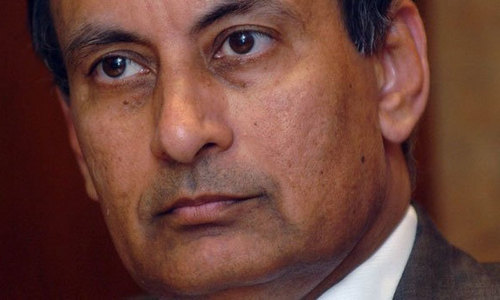The Supreme Court on Thursday wrapped up a case regarding the 2011 Memogate scandal, saying it is the responsibility of the state to arrest and try former Pakistani ambassador to the United States Hussain Haqqani if it so wishes.
Chief Justice Asif Saeed Khosa, who was heading a three-member bench, observed during the hearing that the Memogate Commission had issued its report on the matter in 2012 and a case was registered in light of it against Haqqani, the central character of the 'scandal'.
Timeline: From NRO to Memogate
At the outset of the hearing, the chief justice inquired about the presence of the petitioners in the case, commenting that if the petitioners are not interested in appearing for the hearing, then "why should we waste our time?" He also noted that the Memogate case had been pending for the last eight years.
The additional attorney general informed the bench that the record of the case involved some information of a "sensitive nature". At this, Justice Khosa remarked that he had been "quite surprised" after examining the facts of the case.
"Are the state of Pakistan, armed forces and our Constitution so weak that they can be frightened by a memo?" the top judge asked. Answering the query for himself, he said Pakistan was not so fragile a country that it could be rattled by the writing of a memo.
Read: Seven years on, Nawaz regrets moving SC over Memogate
He noted that a first information report (FIR) had been registered in light of the Memogate Commission's report.
Justice Khosa remarked that the extradition of Haqqani was a "secondary" concern, and that the actual issue was the memorandum that had been written to the US government.
"Neither is that [PPP] government is in power nor is Hussain Haqqani the ambassador [to the US]," the chief justice noted, adding that it was a "separate matter" if the former envoy decided not to return to the country.
The judge said it was the state's responsibility to arrest Haqqani and conduct his trial. "The state can act [against the persons involved] if it wants; the Supreme Court has nothing to do with this matter [now]," he added.
The apex court subsequently wrapped up the proceedings of the Memogate case, throwing the ball in the government's court to decide on the matter.
Memogate scandal
On February 1, 2018, the SC had constituted a three-member bench to resume hearing the controversial Memogate case involving the former ambassador to the US.
The case, first taken to the apex court in 2011 by the then opposition leader Nawaz Sharif, had forced Haqqani's resignation.
At the last hearing in August 2018, the SC had ordered the National Accountability Bureau (NAB) to use its channels for Haqqani's extradition.
The memo in question, delivered to a high-ranking American official allegedly at Haqqani's behest in May 2011, had exposed serious rifts between the PPP government and the army after a US-based businessman Mansoor Ijaz brought it to light.
It was delivered to the then US military chief, Admiral Mike Mullen, and asked for help for the civilian government against the military because of the domestic turmoil triggered by the US raid that had killed Al Qaeda founder Osama bin Laden.
Haqqani, however, had denied having anything to do with the memo.
In 2012, a judicial commission headed by Justice Qazi Faez Isa, which was tasked with probing the matter, had submitted its report to the apex court, holding Haqqani guilty of authoring the controversial memorandum and adding that the former US envoy "was not loyal to the country".














































